#so i spent it on a very gay book by a trans indie author and i dont regret it at all. really want to read it in january
Explore tagged Tumblr posts
Text
inflicted a book buying ban on myself because i Have A Problem and after a few months going strong i must say i underestimated how good it'd feel to slowly make my way through my backlog. gonna extend the ban until april, because i know i'll want to get a few things around my birthday, and i'll resume it again after that. but im really glad i made this choice. i will be a reader first and foremost and a book buyer second!!!
#i did have a small cheat recently because my sister (who im not on speaking terms with) sent me a few dollars#so i spent it on a very gay book by a trans indie author and i dont regret it at all. really want to read it in january
10 notes
·
View notes
Text
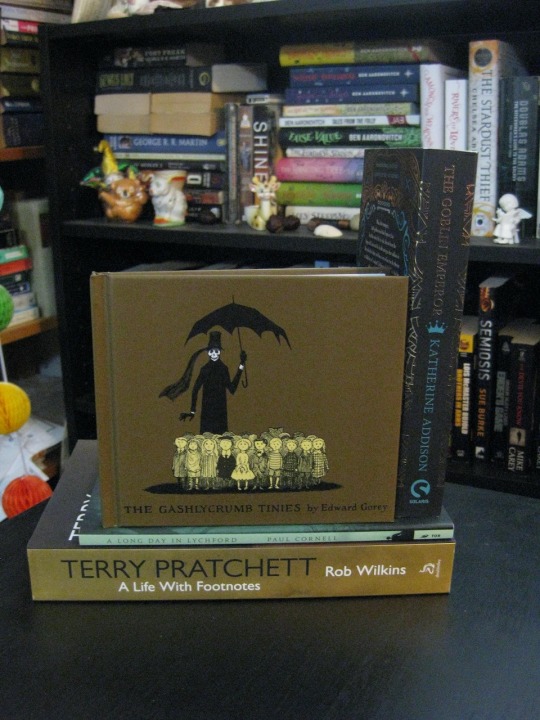
April was not a good reading month but wow, was it a writing month! I spent a lot of my home-based reading time working on my current WIP instead, so I’m trying not to have regrets about how much I didn’t read. I also didn’t truly manage to read anything off my physical TBR, but I’d wanted to reread The Goblin Emperor since I finished it the first time and so technically that’s off my TBR now?
My main bookish achievement this month, besides reading The Adventures of Amina Al-Sirafi, was pulling off another Indie Bookstore Day at work a couple days ago. I had help, my coworkers are awesome, I wasn’t organizing or running it alone or anything, but it’s still a lot of work to put together a party while handling the regular bookstore day-to-day, and then there’s set-up and twice the customers on the day and the tear-down which took all of yesterday…. I did unhaul a bunch of my unread ARCs for a book giveaway as part of this, which I’m very glad about. That’s really going to help my end-of-year stats, I think. (I also unhauled a few of my read ARCs that I was keeping for … some reason?)
And I accidentally bought two books. A Long Day in Lychford was a planned buy, but I got a gift card from my parents for Easter, which went impulsively towards The Gashlycrumb Tinies, and then yesterday I bought some bookish things for a little one and somehow the Pratchett bio found itself in my stack. No idea how that happened. 😅 No regrets, either.
May is going to be a lot like April, I think, or at least it hopefully will involve more writing than reading when I’m home. I’d like to ride the inspiration as far as it’ll take me, after all. It’s also going to be like April in that I’m waiting for the library to come through with a lot of my holds. I’m tag-teaming on a few of them, with physical and e-book reserves. I have no idea what I’ll read when I’m done the ones I’m working on now.
And now without further ado, in order of enjoyment…
The Adventures of Amina Al-Sirafi - Shannon Chakraborty
Amina, mother, retired pirate, signs up for one last job. She should have known better.
8/10
multiracial Muslim protagonist, Indian secondary character, Middle Eastern secondary characters, Muslim and Hindu secondary characters, 🏳️🌈 secondary characters (gay, gender-questioning), Muslim author
The Secret Lives of Country Gentlemen - KJ Charles
Days after Gareth ruins his chances with a charming stranger, he finds himself elevated to an estate in the country—and threatened by smugglers a few towns over. Fortunately (or not), the head of the local smugglers is very familiar….
7/10
🏳️🌈 protagonists (gay), Black British protagonist and secondary character, African-American secondary character, 🏳️🌈 secondary character (not gendered)
warning: child abuse and neglect, mild sexual assault
Once Upon a Tome - Oliver Darkshire
A Millennial offers a behind-the-scenes look at rare bookselling.
7/10
🏳️🌈 author
Tasting History - Max Miller
A cookbook featuring historical recipes reworked for a modern kitchen.
7/10
🏳️🌈 author
Episode Thirteen - Craig DiLouie
A ghost hunting show is the first to investigate the most haunted house in America. It’ll be fine.
7/10
African-American secondary character, 🇨🇦
Eight Strings - Margaret DeRosia
Franco escapes his childhood home to apprentice as a puppeteer and reunites with an old friend, which might mean hope for the future—or his destruction.
7/10
🏳️🌈 protagonist (trans man), 🏳️🌈 secondary characters (lesbian, sapphic), 🏳️🌈 author, 🇨🇦
A Sleight of Shadows - Kat Howard
Sydney sacrificed much to destroy the violent House of Shadows and rebalance the Unseen World of New York—but it looks like the House may not be entirely gone.
6.5/10
African-American secondary character, Latina secondary character
Picture Books
We Don’t Lose Our Class Goldfish - Ryan T. Higgins
Penelope Rex has to look after Walter the goldfish but he scares her.
Grandad’s Pride - Harry Woodgate
When Milly finds a rainbow flag in her grandad’s attic, she learns he hasn’t been to a Pride since before Gramps died—so she finds a way for him to have one.
🏳️🌈 secondary characters (the whole spectrum), 🏳️🌈 author
Reread
The Goblin Emperor - Katherine Addison
Maia suddenly finds himself Emperor of the Elflands and must find a way to be true to himself while navigating thorny court politics.
🏳️🌈 secondary character (gay)
Currently reading:
Magisteria - Nicholas Spencer
A history of the interactions between science and religion. Out in May.
The Sinister Booksellers of Bath - Garth Nix
The booksellers of Bath must rescue Merlin after he’s trapped in a map—which might mean taking on an unknown Entity.
🏳️🌈 main character (genderqueer), Black British secondary character
Stats
Monthly total: 7+1 Yearly total: 44/140 Queer books: 4 Authors of colour: 0 Books by women: 4 Authors outside the binary: 0 Canadian authors: 2 Off the TBR shelves: .5 Books hauled: 3 ARCs acquired: 7 ARCs unhauled: 14 DNFs: 0
January February March
#books#booklr#bookblr#adult booklr#book covers#book photography#my photos#stacks of books#reading wrap-ups#read in 2023
23 notes
·
View notes
Photo
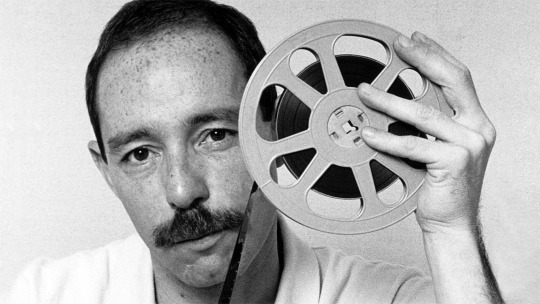
He Was Here.
On the anniversary of Vito Russo’s death from AIDS, filmmaker Jenni Olson remembers the activist and author, who helped so many—including Olson herself—crash out of the celluloid closet.
Back in 1986, when my film studies professor handed 23-year-old me a copy of Vito Russo’s book, The Celluloid Closet, little did I know how life-changing it would be. I would go so far as to say that Vito’s powerfully written analysis of the history of homosexuality in the movies actually saved my life.
First published in 1981, The Celluloid Closet covered the history of LGBTQ representation on screen since the dawn of motion pictures. Vito wrote about films as far back as Richard Oswald‘s 1919 Anders als die Anderen (Different from the Others), the German film considered to be the first gay feature, and Mädchen in Uniform, the beautiful and surprisingly political 1931 German drama considered to be the first lesbian feature.
Covering more than a hundred movies, the book spanned all the Hollywood stereotypes: the proto-gay sissies like Franklin Pangborn and Eric Blore in the 1930s; the creepy coded predatory lesbians of the 1940s and 1950s (like the prison matron in Caged); sensational trans depictions like I Want What I Want and The Christine Jorgensen Story, and half-lurid, half-comical bisexual tales such as A Different Story.
Vito revisited the book towards the end of the 1980s, incorporating some more recent achievements of the time, like the Academy Award winning documentary, The Times of Harvey Milk and beloved LGBTQ indie classics like Donna Deitch’s Desert Hearts and Bill Sherwood’s Parting Glances. (There is, naturally, at least one Letterboxd list of all the films in this revised edition.)
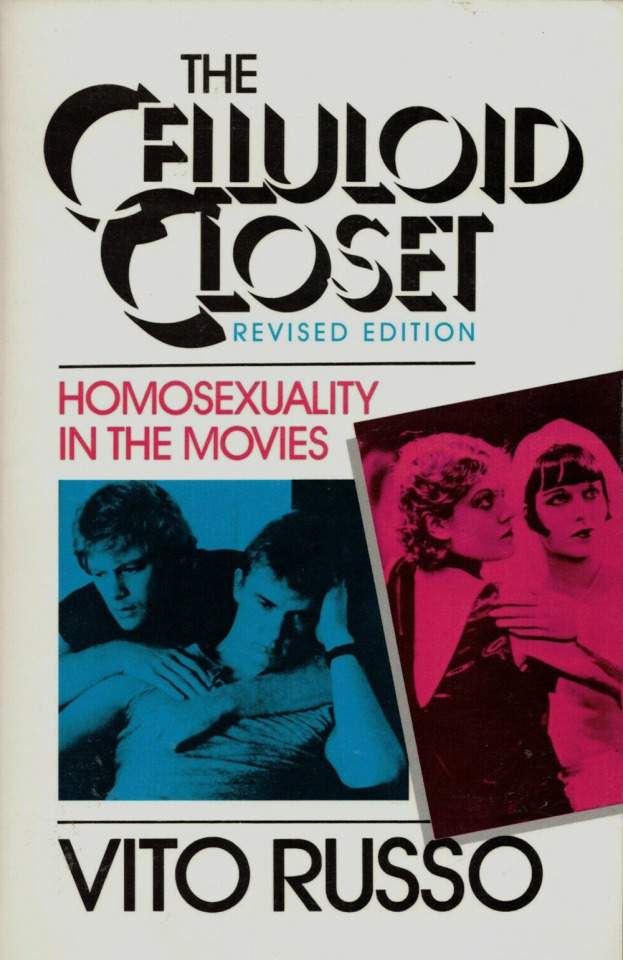
When The Celluloid Closet landed in my hands, I had been miserably stumbling along in college, and in life, for the previous five years. Vito’s book was the catalyst for my coming out to myself as queer (I wanted to see all those movies he wrote about) and for coming into the LGBTQ community (I imagined everyone else might want to see those movies too).
And so, despite having zero experience in how to do it, I started a weekly queer film series on campus, which brought hundreds of people out to the movies each Wednesday night. While there were certainly LGBTQ stories being told on screen in 1986, it was still an era where these films were much harder to access. Some were shown on television or available on VHS tape, but often these films had to be seen at film festivals or arthouse theaters.
The very first films I programmed in that series included some titles that remain among my favorite LGBTQ movies of all time: the aforementioned Mädchen in Uniform; the wonderfully romantic, 1968 French schoolgirl drama Therese & Isabelle; and jumping ahead to the indie gay films of the 1980s, Arthur J. Bressan’s devastating AIDS drama, Buddies (1985).
A few years later (with my University of Minnesota film studies BA in hand), I jumped in to become co-director of Frameline in San Francisco, the oldest and largest LGBTQ film festival in the world, and carved out a queer corner of the internet for movie lovers, co-founding the massive LGBTQ movie database, PopcornQ (aka “the gay IMDb”) as part of the world’s first major LGBTQ website, PlanetOut.
Along the way, I also worked as a queer-film critic, queer-film historian, queer-film collector, queer-archival researcher, queer-consulting producer (most recently on Sam Feder’s acclaimed overview of trans lives on screen, Disclosure), and spent a decade driving the marketing efforts of the oldest and largest LGBTQ film distributor in North America (Wolfe Video). And I made some films myself. (Yes, there is a Letterboxd list!)
At some point, Vito and I became friends. More than that, he became my mentor. He instilled in me a passionate belief in the power of LGBTQ cinema; in all the ways that films can give us the support and compassion, the inspiration and validation, the respect and dignity, the complexity and nuance, the joy and entertainment that we need and desire. And yes, even the messy and fucked-up representations, too. (Be gay, do crime, etc.)
Vito died of AIDS on November 7, 1990. As the 31st anniversary of his passing approaches, I’ve been thinking a lot about leadership, both personal and collective, and how we make positive change.
In addition to his groundbreaking work on that life-changing book, which was made into the tremendous, must-see 1995 documentary The Celluloid Closet, Vito had long been an important gay activist in New York City, eventually co-founding ACT UP in 1987.
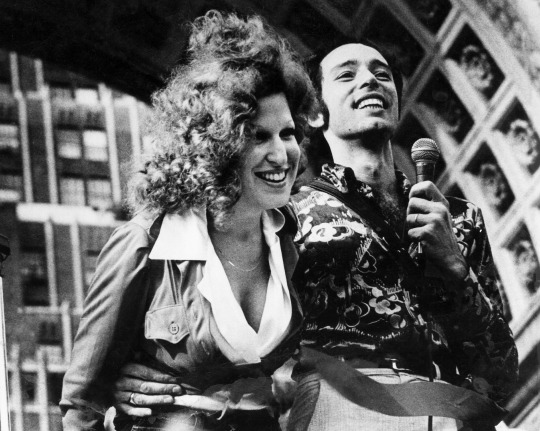
Russo with Bette Midler at the 1973 Gay Pride Rally in Washington Square Park, New York.
Vito was also one of the founders of GLAAD, the US-based LGBTQ media advocacy organization dedicated to (among many other things) improving LGBTQ representation in film and television. Since 1985, GLAAD has had an enormous impact in transforming the on screen landscape with regard to LGBTQ characters and stories, cast and crew, coverage and visibility of queer cinema.
This year—this is such a beautiful and deeply moving thing for me—Vito’s mentorship came full circle. I now work for GLAAD. It is my actual job, every day of the week, to carry on his legacy.
As director of our Social Media Safety program, I advocate for LGBTQ user safety around content moderation, data privacy, problematic algorithms and other forms of tech and platform accountability (yes, including Letterboxd). I also get to be involved in some of GLAAD’s other media advocacy work.
One of the most impactful things that GLAAD produces each year is the Studio Responsibility Index, which evaluates each of the major Hollywood studios and serves as a road map toward increasing fair, accurate and inclusive LGBTQ representation in film. There’s an equivalent publication covering the television industry: the Where We Are On TV report.
GLAAD’s most public media advocacy work is the annual GLAAD Media Awards, honoring fair, accurate and inclusive representations of LGBTQ people and issues in film, television and other media. (Submissions are open until December 7, 2021—if you’ve made something, make sure we know about it.)
Every year the event honors Vito’s legacy with the presentation of the Vito Russo Award to an openly LGBTQ media professional who has made a significant difference in promoting equality for the LGBTQ community. Recent recipients include George Takei, Billy Porter, Samira Wiley and Ryan Murphy.
In an interview with Making Gay History author and podcast host Eric Marcus, Vito talked about the legacy he wanted to leave, citing Spanish filmmaker Pedro Almodóvar.
“He said, the thing is, is you can’t regret your life, otherwise why did you live? What was the point of having a life if you didn’t say something or do something that was gonna survive after you’re gone… I really feel the reason why I’m here is so that I could leave this book and these articles so that some sixteen-year-old kid who’s gonna be a gay activist in the next ten or fifteen years is gonna read them and carry the ball from there.”
I love the thought of how amazed Vito would be if he could see what LGBTQ representation on the big screen looks like today compared to where we were when GLAAD was founded 36 years ago—in large part because of his leadership.
Let me just shout out a few Letterboxd lists that so vividly illustrate this point: Intersex, LGBT POC, Films featuring LGBTQ characters/folks with disabilities, LGBT+ films from Southwest Asia and North Africa, TRANS, South Asian LGBT, Directed and/or written by transmascs and trans men, Todos Me Miran: The Queer Latinx Experience. And hey, if the movie list you want—or indeed the movie—doesn’t exist yet, may this be the inspiration that prompts you to create it.
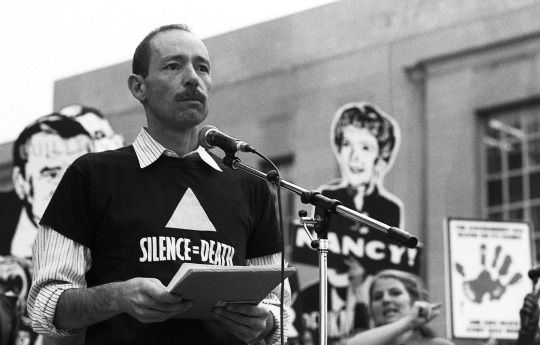
Activist and author Vito Russo. / Photo by Rick Gerharter/HBO Documentary Films
You can learn more about Vito in Jeffrey Schwarz’s beautiful 2011 documentary, Vito. And, you could begin applying GLAAD’s Vito Russo Test to your movie-watching habits. Briefly: a film must include an identifiable LGBTQ character; who is not solely defined by their sexual orientation or gender identity; and, the character must matter to the plot. This short video on GLAAD’s YouTube channel explains it more—there are already many Vito Russo Test lists scattered across Letterboxd.
Lastly, follow GLAAD’s brand new Letterboxd HQ account, where you can discover some of the best LGBTQ films of the past few decades via our lists of GLAAD Media Award Winners. A quick name drop of a handful of those honorees over the years just to whet your appetite: The Wedding Banquet, Pariah, Go Fish, Brokeback Mountain, Moonlight, The Incredibly True Adventures of Two Girls in Love, Call Me by Your Name.
Grazie, Vito!
Related content
World AIDS Day is December 1—Here’s a Letterboxd list of films that ensure we never forget.
Rebel Dykes, a documentary mash-up of animation, archive footage and interviews about a radical lesbian subculture in 1980s London, opens in UK and Irish cinemas from 26 November (US release TBA)
All the Good Boys: Schlockvalues’ essay for Letterboxd on the real roots of queer cinema and the evolution of gay masculinity on screen
15 notes
·
View notes